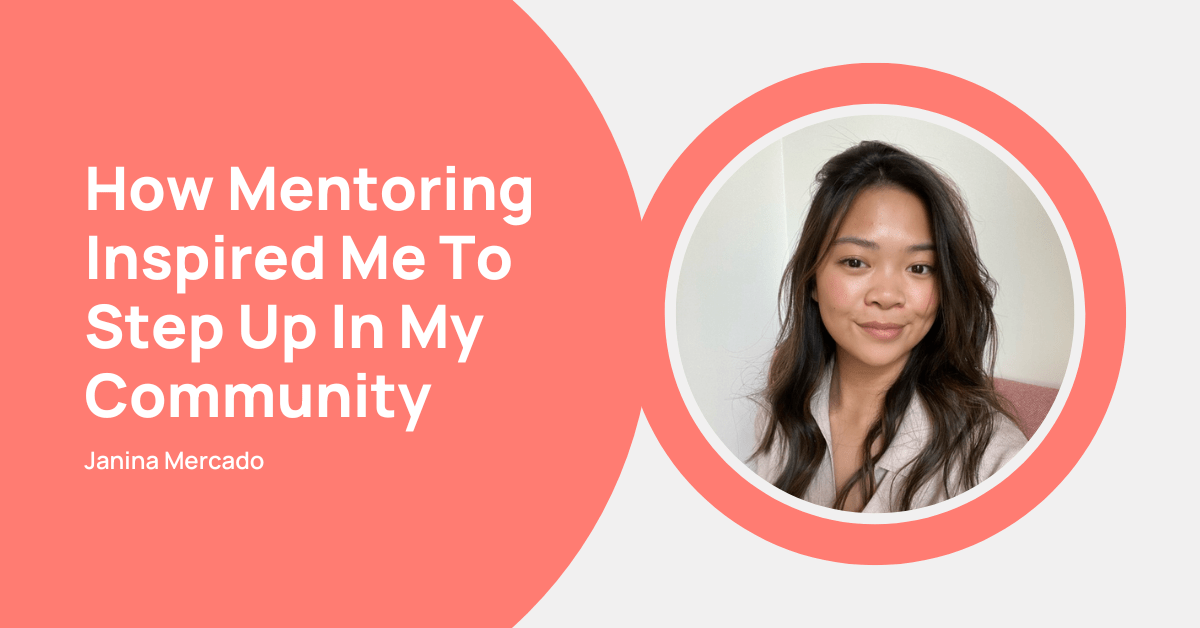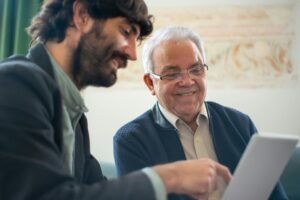Mentorloop Customer Success team member Janina Mercado shares how she experienced mentoring in her church community and the impact it had on her life within and outside of her community.
You could say before Mentorloop, the concept of mentoring wasn’t something I consciously thought about. I knew it was something that people were involved in but always thought it was only for those in the big leagues – more for suit-and-tie, high-rise office vibes, or maybe even those celebrities who do it for publicity.
Now, having been with Mentorloop for 2.5 years, I know that mentoring comes in many different forms and doesn’t always have to be what I thought it was – reserved for special people in special circumstances. And looking back at my experiences through that lens, I now recognize that there have definitely been some times when I’ve been mentored and been a mentor without necessarily thinking of it in that way!
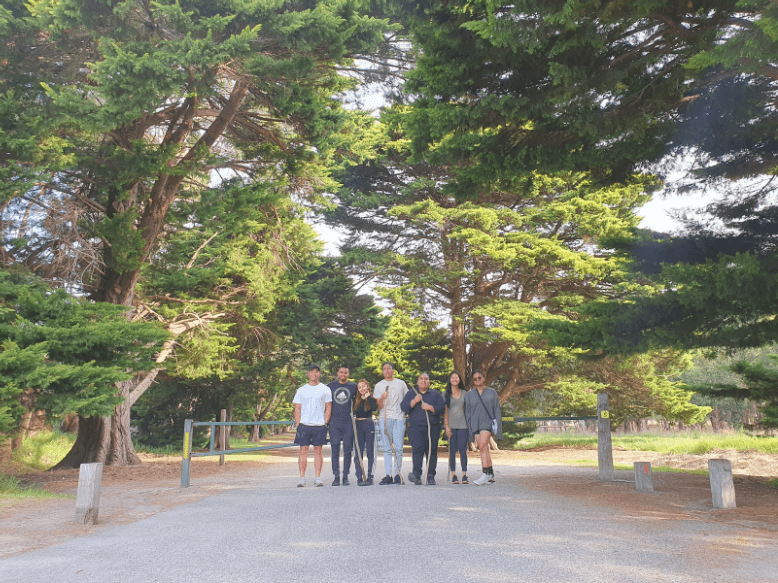
I grew up in church and watched my older cousins participate in activities I tried to tag along in. In all that time, the idea of becoming a youth leader never really crossed my mind. I always saw it as a role for the older individuals who knew everything about the Bible, God, and everything else about the church. So, even though there was encouragement from church members and previous pastors for those around my age group to step up, I just wasn’t particularly inspired or motivated to do that. Because on top of the preconceptions I already had, I had no examples or role models that I could see myself emulating and there wasn’t clear guidance on what to do or even a clear path to follow. The church leaders kind of just expected us to figure it out, which isn’t exactly inspiring or motivating, and unfortunately also makes it easier to coast within the community.
Meeting My Mentor
In 2020, our church welcomed a new pastor who I like to call Pastor J. We met him online during the COVID lockdowns in Melbourne and everything was on Zoom. From the very beginning, he brought a fresh perspective and wasn’t the kind of pastor who just told everyone what to do or did everything himself. I think at times, people think Pastors of a church are supposed to do everything and we just follow. I certainly held this opinion until Pastor J showed us that this didn’t need to be the case.
Pastor J encouraged and empowered everyone to do their bit no matter how insignificant it may seem – from crucial roles in the community to something as simple as greeting church visitors. He also provided opportunities not only for myself but for anyone who wanted to be involved in the growth of our church but just didn’t know how to start. Looking back at how much I learned from him and how much he has influenced how I interact with my community, I realise he is more than just a pastor in my church – he was a mentor and a good friend.
The Importance of Having Opportunities to Lean Into Strengths and Interests
In the early days of COVID lockdowns, my church would have weekly service and youth group catch-ups on Zoom which weren’t limited to just members of our church. Many of the attendees in this weekly meet-up had never met each other before. The format of these catch-ups was simple. We had icebreakers, prayer, and then group discussions about various topics – from our beliefs, relationships, racial issues, world religions, and mental health. At the end of each session, we always took time to just banter and talk about timely issues and controversial questions which I and many others in the group really enjoyed.
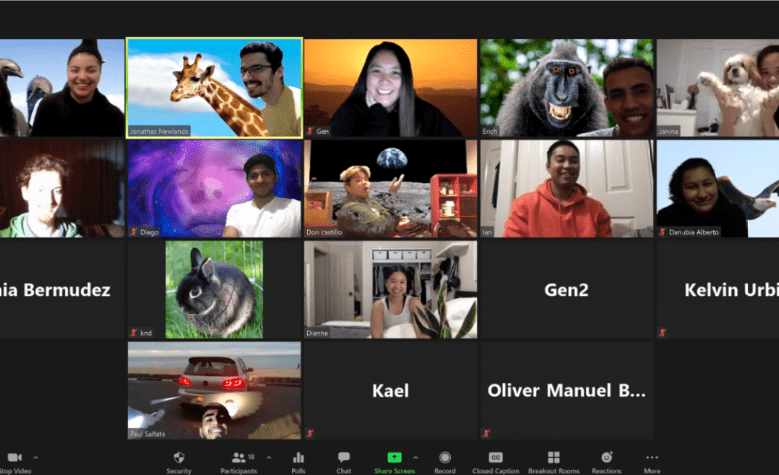
This photo was one of the icebreakers, showing our favourite animal or thing – mine was my dog Mekai!
Pastor J picked up on this and set us a challenge – everyone had to take turns picking a topic and providing questions for everyone to answer and/or discuss. Now, I love a good PowerPoint presentation so I was all in. We had never done something like this before and it could have easily been quite intimidating but because he allowed us to anchor the activity to something we liked or were generally interested in, it was fun! He also didn’t just leave us to it. He set an example by doing the first topic and even giving us topic suggestions.
The topic I chose was Confidence: An Approach to Self-Esteem and Body Image. I chose it because I thought it would be relevant for the group to get a better understanding of self-worth and self-esteem in a context outside of physical or material things or references. It was a great experience as the group embraced it and joined me in opening up about things we weren’t confident about and helped each other see these things in a more positive light – seeing our inherent value as individuals in the context of our faith and our community.
Human connection was hard to come by during these times and having something to prepare for and look forward to presenting gave me confidence and purpose during a time that was so uncertain and is something that I carried with me post-lockdown and still feel now.
The Value of Human Connection
And speaking of human connection, through these activities, as simple as they seem, I developed an appreciation for how important meaningful connections are and how much we take this for granted. Humans are social creatures – we aren’t meant to be alone! So being able to network and have this sort of community when things were uncertain was so valuable.
When restrictions started easing and we were allowed to have in-person events again, we were able to enrich the community we built and nurtured online. It was almost like we’ve all known each other for a while even though for some, it was the first time seeing each other face to face! So not only have I learned to lean on my existing connections during this time, but I also made new lifelong friends.
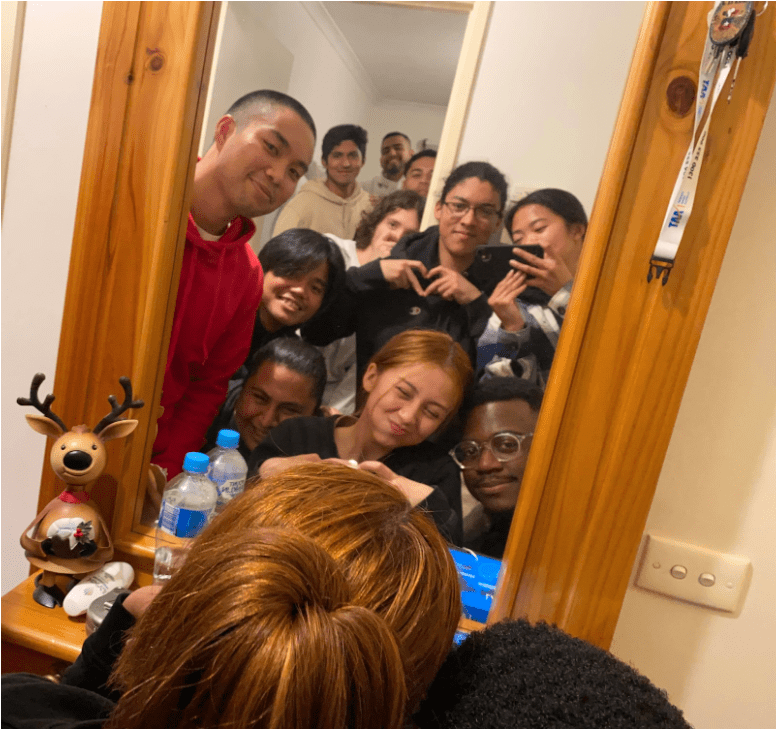
The Power of the Right Kind of Feedback
I learned from Pastor J the impact that constructive and positive feedback can have on a person. Because he didn’t just tell us to give feedback in this way, he modelled to us what it should look like.
At church, someone gets assigned to arrange the service runsheet every week. When I got my turn, he asked me why I arranged the service in the way I did. My reason was that it was just how everyone else did it and I assumed it was how it was it should be done. Instead of telling me I did something bad or ordering me to change things when he thought something needed to be revised, he gave feedback in a way that empowered me to think more critically and not be beholden to how things were done in the past. Instead, he would tell me to think about the flow of service and decide what needs to happen at which points based on that.
And if things go wrong during a service, I was never made to feel bad for it. Instead, he would always thank me for organising service thoughtfully. He would also always point out one thing that went great and one thing that could be improved and why, along with some suggestions.
It showed me the power of giving people constructive yet positive feedback. It taught me that the important thing was trying and giving your best. So even if I failed at something, I didn’t feel terrible about it. In fact, I felt eager to try again and eager to do better. What this kind of open environment for feedback did was make space for different perspectives and insights, which ultimately made me better.
I strive to apply this in my everyday life now because, after all, you never know how far that feedback can go for someone’s confidence and self-esteem. It certainly helped me and I would love to do the same for other people.
You Always Have Something to Offer
I can sometimes feel like what I have to say might not make sense to many people. This is because the way I best understand and therefore like to explain things, is by relating a concept to random and sometimes mundane examples that make sense in my head.
For instance, let’s take the topic of understanding the rules in the Bible or addressing common questions about why it seems we have to follow so many rules. Some people see rules as restrictive and controlling – almost forcing you to do something. But if we take the time to understand why that is, it can be about protection – like the speed limit in a school zone. It’s a law to drive at 40 mph, but not everyone follows it. However, the rule is there to protect us and the children around the school.
This kind of method probably doesn’t work for everyone but my mentor has shown me that there will always be one (or even a few!) who will get value from what I have to say and that alone makes it worth saying.
Growth Is Never Found In Your Comfort Zone
Ultimately, with all of this support from Pastor J, I found myself being more open to stepping out of my comfort zone.
Those Zoom catch-ups? I eventually put my hand up to run weekly online exercise sessions for anyone interested. I never used to go to the front of a group to share something but I found myself starting to do it as soon as we were allowed face-to-face events and still do it now.
I’ve also found the confidence to participate in more public-facing activities like Christmas carolling and doing community outreach! I even find myself taking the initiative to banter with the older people in my community and enjoying it!
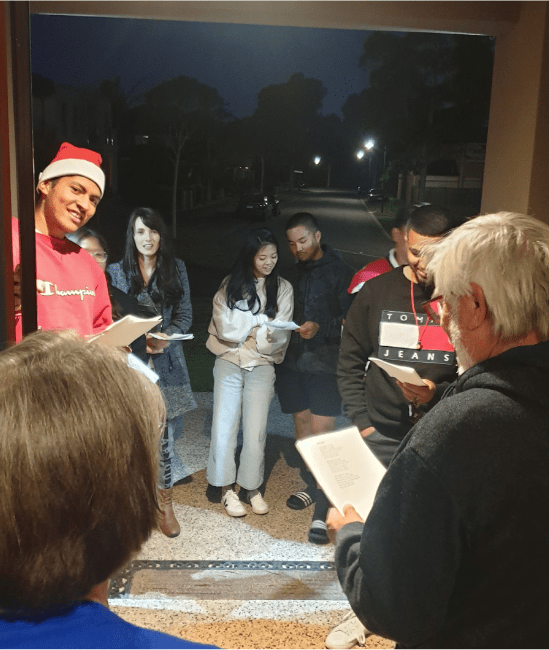
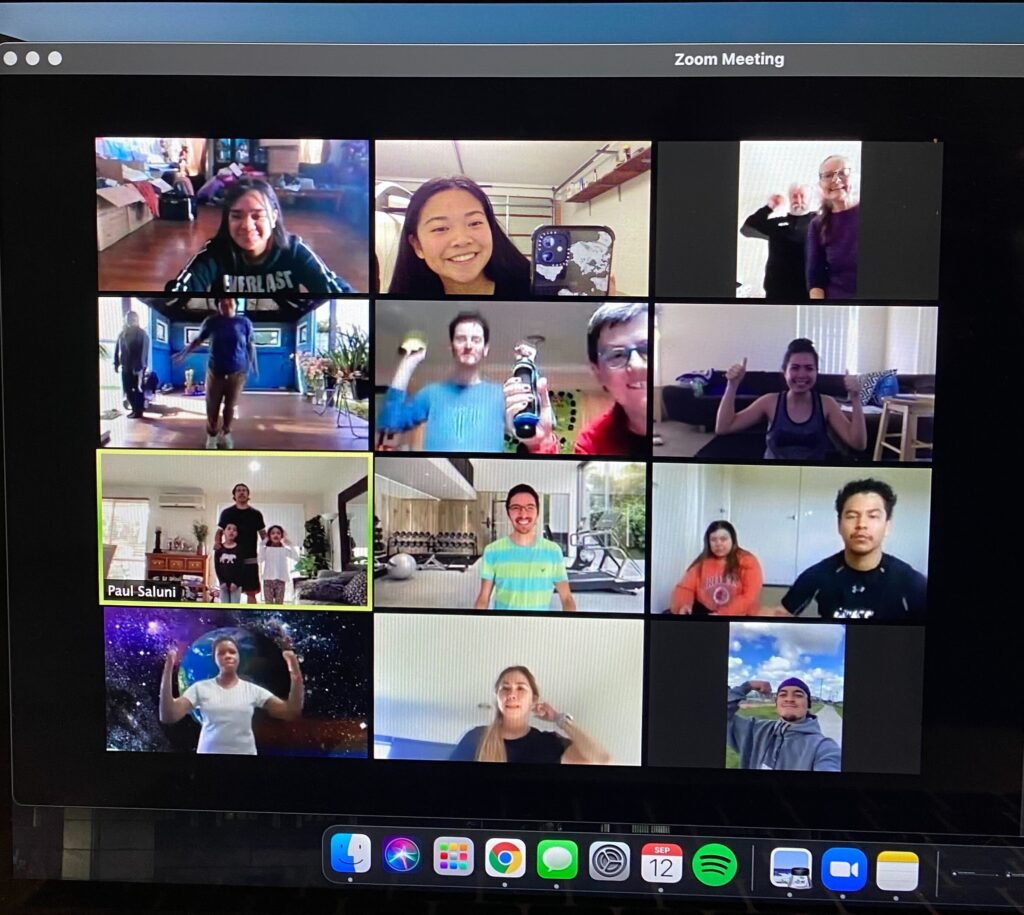
I never thought that this would be something that interested me or something that I would enjoy but I’m finding myself looking forward to opportunities to do these things.
My perspective towards trying new things, speaking up, and understanding different perspectives has changed now. I’m less hesitant to do all of these things knowing that I have the tools to succeed because of the guidance I’ve been given but if I fail, I’ll have support through it and encouragement to get better.
A Mentor’s Lasting and Long-Reaching Influence
I’m truly grateful for the mentorship I’ve received, even though I didn’t realise what it was at the time. Not only has it given me a sense of purpose as a member of my church and community, it has also influenced other areas of my life.
Being An Authentic Leader
Now, as a youth leader, I’ve found the confidence to be the kind of church leader that I want to be and that’s authentic to who I am instead of what I grew up seeing and not being inspired by. I am now also inspired to be a mentor in my community to be that same guiding presence for others.
I’m now regularly involved in facilitating the church’s youth group discussions with those in my age group and younger and I have thrived doing it in the way that I think is most valuable for them and takes advantage of my strengths.
I’ve decided that, just as Pastor J connected us and our community by allowing us to lean into our interests and strengths, I will engage with those in the group I facilitate by leading with what interests them too. So, rather than selecting topics that followed the set curriculum, I’ve found that discussions are more meaningful for them when they are interested in what we’ll be discussing. So we talk about the stories in the bible that they’re interested in, certain life experiences, and trying to work from the basics of understanding faith from a perspective of love.
This is a huge jump from what I grew up with. When I was their age, you just knew that you had to come to church and do bible study because your parents said so. I didn’t have an understanding of why I had to do it or why I should be doing it. It was more like a chore than a choice. I want those that I mentor to have a better experience and to actually want to come to our sessions.
So I try to get to know them – what they like and what they enjoy doing. That way, I can guide them in applying what they have learned in specific areas of their life rather than the lessons staying as mere theories in their head.
Something that reassured me that I was doing the right thing was when one of my mentees’ parents came up to me and asked why we suddenly changed the topics at one point. See, I had to go back to the set curriculum that I tried to pivot from at one point. As I was chatting with this parent, they told me that their daughter really enjoyed the way we initially did them because she was able to take bible stories and apply those principles to daily life.
It was such a validating experience to learn that in being myself and being the leader I want to be, I’m making a real difference in my mentees’ lives. So, we are now back to doing it the way they and I like it and each quarter, I give them the choice of which lesson guide they want to do!
Being Okay With Not Knowing Everything
There have been times when I didn’t know if I had provided enough for my mentees. I will be the first to admit that I’m not someone who necessarily knows everything about the bible. I try to be as prepared as I can be ahead of sessions but the truth is, I’m also learning along with everyone else!
So I try to open myself to what they have to say and their experiences, and then instead of talking at them, we take a learning journey together. I’ve found so much fulfillment in doing this because they teach me so much too! Having this new-found openness to different perspectives, I’ve found that their insight also teaches me things and I find that I’m always learning from them too.
It made me realise that mentors don’t have to know everything! Mentoring is a learning experience for mentors too and it’s okay for me not to know everything despite being in a teaching and mentoring position.
Instilling Confidence in Others
As I grew in confidence, I knew that I wanted to empower others too. So I made sure that in getting to know those that I teach, I make an effort to find what works for them as individuals, allowing them to be more comfortable during our discussions and speaking more often.
One group participant in particular, a girl of about 13, has taught me so much in the course of our discussions. She is a history buff who loves exploring the context around bible stories considering the time they would have taken place – why people would have acted the way they did, why society was set up the way it was, etc. It gives the group, me included, a better understanding of why some decisions were made, or why certain actions were taken in the stories we’re discussing. I told her how helpful and valuable her contributions were to our discussion and how much I continue to learn from her too. It seems to have given her that little push to be more involved in discussions and contribute to the group in a way that takes advantage of her interests and strengths too!
It makes me happy to see her and other members of the youth group become more involved – not just in participating in discussions or singing at service but also in things like helping out with admin and even lending a hand in the kitchen.
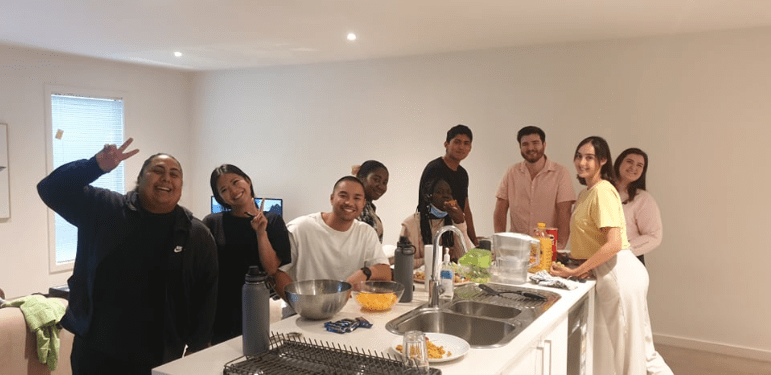
The Value of A Mentor
Needless to say, I’m incredibly grateful to my mentor. Not only for seeing potential in me but for inspiring me to step up in my community in a role that I can feel myself thriving in.
I’ve seen so much growth in myself and have seen the power of being a mentor that it’s now my hope that I can be the same influence for someone else. It’s great to feel like an older sibling for others and it makes me want to be better – a better community member, a better facilitator, and a better example for them. And all of this is because I had one mentor who saw something in me and inspired and encouraged me to step up.
Today, I still learn a lot from him and lean on his guidance. I now consider him a great friend, as does my partner – so much so that we asked him to officiate our wedding!
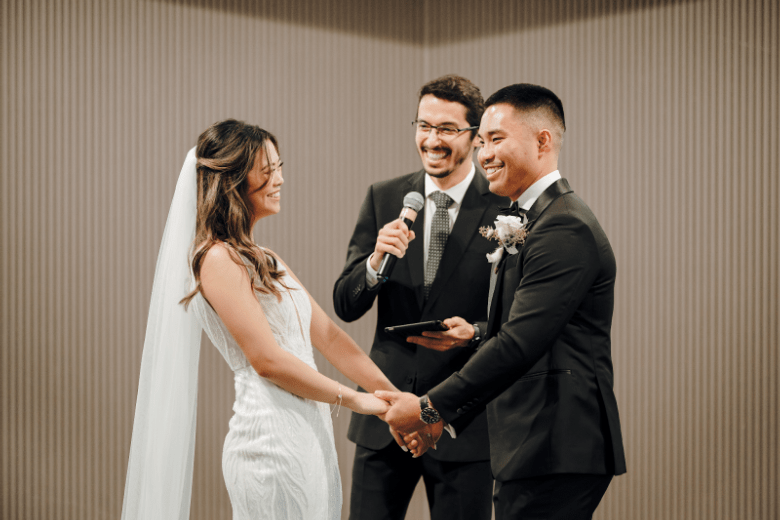
Here’s me and my husband, Ian, sharing a laugh with Pastor J at our wedding ceremony.
The Impact of Mentorship Outside of My Church Community
The ways I’ve grown and stepped up in my community have been valuable but I’ve also seen positive changes in other parts of my life. These changes are ones that I can say have definitely been influenced by the confidence I gained through Pastor J’s mentorship.
I’ve been asked many times to MC people’s birthdays or plan game portions at social events like people’s baby showers and have taken to accepting these opportunities and enjoying them. For one of my Volunteer Days (shoutout to Mentorloop for allowing us Volunteer Leave!), I even ran a holiday school program at our church which was fun and fulfilling.
I find that more people now go to me for help or support when they need it and I think that stems from not just the confidence I gained but also the fact that this confidence has inspired me to step up in my community.
I also now find myself being more confident at work. Not just in my abilities but also in things like public speaking. I do webinars for customers often and I find that I’ve gotten so much better at it over time. I’ve also noticed that I now try to contribute to work discussions and share my thoughts even if I think it might take me a bit longer than others to explain my point. This has only been helped by the culture we have at Mentorloop where everyone is given the space and opportunity to try new things and contribute their ideas.
Overall, I can say with 100% certainty that the mentoring I’ve received has made a profound and positive contribution to my growth as a community leader, working professional, and individual. In turn, it has inspired me to grow even more as a person by sharing more of myself in other areas of my life outside of church – be it socially or professionally – and to continue stepping up in my community by being a mentor to others too.

